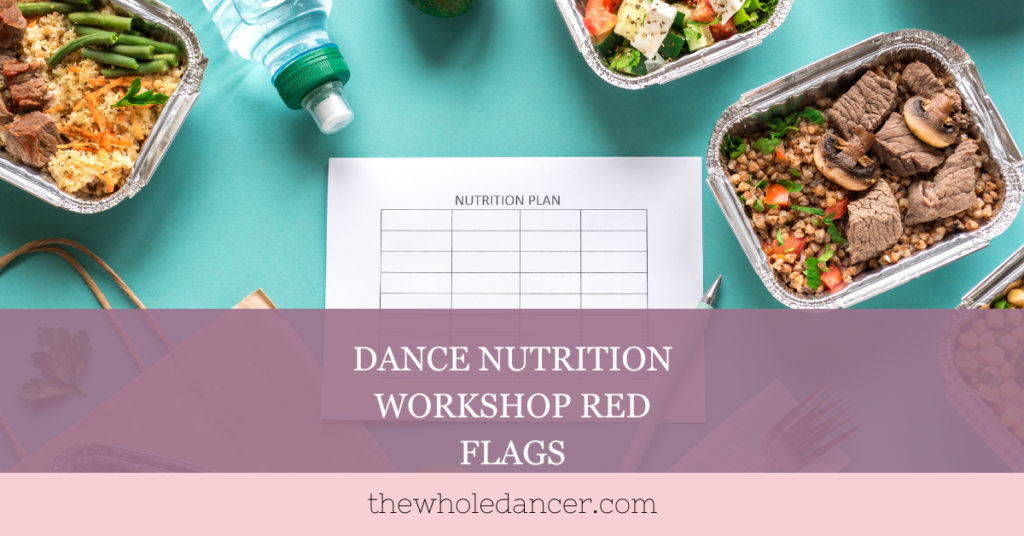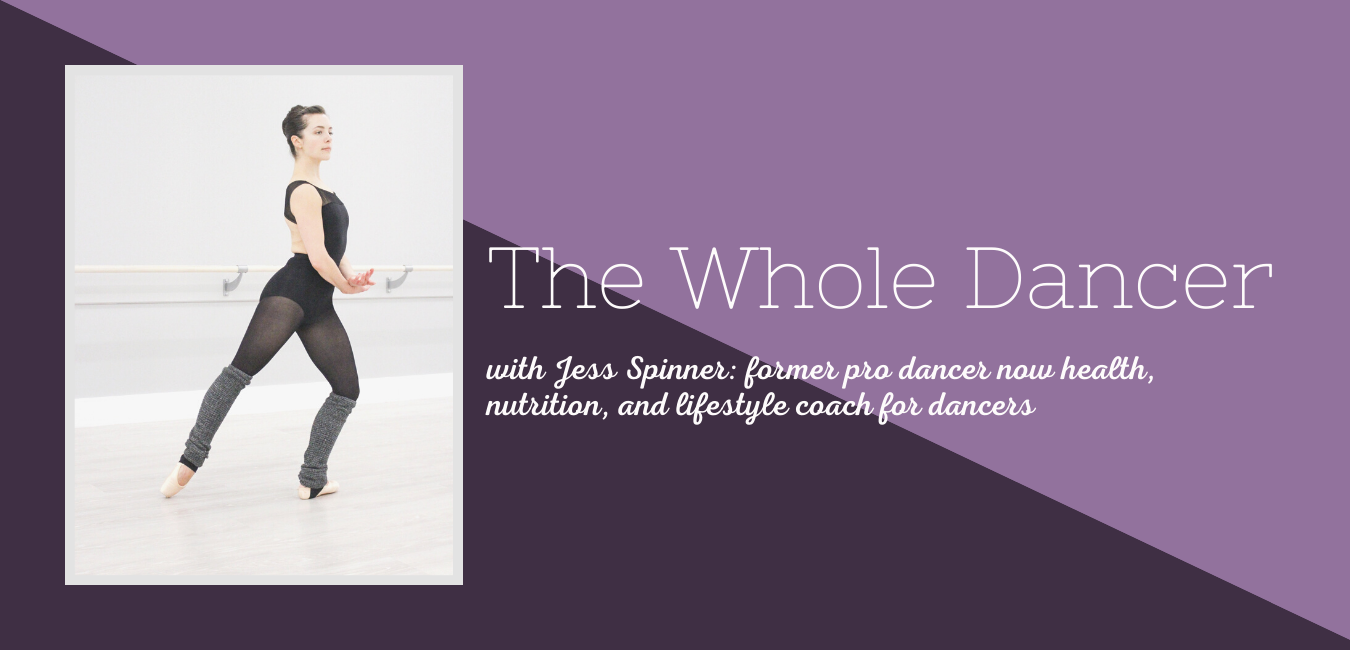Dance nutrition workshops can be extremely valuable. It’s a way for dancers to gain information without the individual investment of one-on-one coaching. It can also inspire a dancer to seek out coaching support when they might not have otherwise.
At summer intensives, a dance nutrition workshop is pretty standard. After hearing some horror stories about the information presented to young dancers at workshops this summer, I had to write this post.

You would think there should be a magic credential or some criteria all dance nutrition workshop presenters have to meet. However, the reality is there are a variety of nutrition professionals who might support dancers. They each have very different backgrounds and approaches. This means there are more people available to support dancers which is great. You can choose a person to work with based on a true connection. The downside is that it can also lead to unqualified people giving out bad advice.
Red Flag #1: The person has nutrition training but no connection to dance.
Always question the background and credentials of the person presenting you with information. Whether a health coach, nutritionist, or dietitian is presenting at a dance nutrition workshop, if they don’t understand the dancer mindset or haven’t experienced the dance world at a professional level themselves, they’re unlikely to provide a well-rounded workshop for dancers.
Registered dietitians (RD) are revered as experts in nutrition. They have an extensive educational background and continuing education requirements. Many dance schools will hire an RD and assume they’re all going to present the same information in the same manner. However, even within the standardized field of dietetics, you’ll find very different narratives and approaches. You’ll even find conflicting conclusions based on the nutrition studies and data that exists. This is because they may use the data to highlight the benefits of a specific way of eating without also clarifying that it may not be a benefit to everyone.
In the path I took to health and nutrition coach, there aren’t regulations that dictate a level of training someone must complete before calling themselves a health coach. My personal commitment is to seek out additional certifications each year. I continue to do so to ensure that I’m providing dancers with scientifically backed, valid, and helpful strategies, support, and information. If a health coach without certifications or with no recent study in nutrition presents a workshop, the information may be outdated or even harmful.
Red Flag #2: They give dancers food rules to follow.
If a dance nutrition workshop presenter gives you a list of absolutes or rules to follow, run the other direction. Outside of making sure to include a variety of foods and eating enough, there shouldn’t be absolutes in dance nutrition—or any individual approach to nutrition. What’s best for one dancer isn’t necessarily what’s best for the next.
There’s no need to vilify sugar or act as if occasional sweets will be a major detriment to a dancer’s success or performance. The conversation needs to be balanced in order to acknowledge our individual differences. Providing dancers, especially young dancers, with absolute food rules can lead to restrictive or disordered eating patterns.
Red Flag #3: They don’t address the dancers’ relationship to food.
How you’re experiencing and relating to food is incredibly important. For most dancers, food and body image are inextricably intertwined. Therefore, you can’t address food without also discussing body image.
Beyond that, there are some common experiences among dancers that should be brought up in a dance nutrition workshop. Dancers are busy so packaged, convenience food will likely need to be part of your eating plan at least sometimes. The benefits of meal planning and organized grocery shopping should be discussed. All of these things contribute to finding an easygoing relationship to food, which is an essential goal for all dancers.
Red Flag #4: They use a standardized, one-size-fits-all mentality for dance eating plans.
You are unique and so are your needs. There’s no perfect meal plan that all dancers should follow. If you’re told that you can’t be a vegan or vegetarian as a dancer, there’s some important information missing from the dance nutrition workshop. Some presenters might encourage calorie or macronutrient counting. This is rarely a healthy practice for dancers and something most should steer clear of.
A well-rounded dance nutrition workshop should encourage you to experiment. That’s the way to discover the best way of eating for your personal needs. In my field, we call this bio-individuality. It’s the idea that each of us has a unique genetic makeup, activity level, lifestyle, and personal life experiences. These things all impact our food choices and how certain foods work within our bodies.
Red Flag #5: They don’t highlight the primary nutrition concern for most dancers: weight.
Many dancers are concerned with weight. You may feel pressure to be smaller, even if no one has ever given you that feedback. These body concerns can impact your food choices. They may lead you to eat less even if you should in fact be eating more.
Most dancers are under fueling. Any dance nutrition workshop should provide lots of advice and information not only on the importance of adequate fuel but also strategies on how to accomplish that.
If you are at a summer intensive and the nutrition workshop starts raising these red flags, you should take some notes and be ready to ask questions of a trusted nutrition professional. If you’re struggling with body image or have been given bad advice and are confused, reach out! Take advantage of a complimentary coaching call. I can help you sort through the noise and discuss if you might be a good fit for ongoing support.
